- Home
- William Miller
Gloucester Crescent Page 3
Gloucester Crescent Read online
Page 3
Every now and then, to confuse the police, she gets the dustmen to push the van to a new spot in the street. She thinks that if the van is moved a few houses down from where it was the police won’t think it’s the same one. When this happens, Miss Shepherd sits at the steering wheel with the door open and her arm sticking out the side to let the dustmen know when she wants to stop. These moves always worry everyone in the street because no one knows if the van, with Miss Shepherd in it, will end up parked outside their house. We’ve had it outside ours quite a few times and the smell is terrible, but it’s now been outside the Roebers’ for some time and it looks like it might be there to stay.
Like the Haycrafts, we also have someone who came and never left. She’s called Jeanie, but she isn’t a burglar and doesn’t live in a van. Mum and Dad always call Jeanie their daughter and introduce her to everyone as that. Me, Tom and Kate call her our sister, which has always felt totally normal. She isn’t really our sister, as we know her mum, who’s Jamaican and used to be our nanny and housekeeper. I really love Jeanie, she’s like the big sister all my friends wish they had. Although she’s fifteen years older, she never minds playing with me, is really kind if I’m ever sick and is always around in the same way that Tom and Kate are. She comes on holidays with us and takes me to classical music concerts at the Festival Hall with her friends.
Miss Shepherd’s van outside number 61
Jeanie’s real mum is called Beatrice, and now lives in a tower block near Euston Station. Beatrice came over from Jamaica on her own and got a job as a cleaner in a hospital called the Royal Free, where Mum was working. This was all before I was born, but she came to clean our house and then had to stop when Mum, Dad and Tom went to live in New York. Then I was born and we moved back to Gloucester Crescent, and Mum and Dad asked Beatrice to come and work for us as a nanny and housekeeper. By then her two daughters, Jeanie and Esther, had come over from Jamaica too, so they all moved into the flat on the top floor of our house. Jeanie was 15 and Esther was 13, and it wasn’t long before they started coming downstairs and hanging out and playing with me and Tom. Beatrice was our first nanny, but we’ve had quite a few since her: there was Christine, who had a baby called Janey-Waney with the man who ran the junk stall down on Inverness Street. Then there was Cathy, followed by Jean, whose husband, Dave, made me and Tom balsa-wood gliders, and then finally Marina González, who’s our nanny now.
Anyway, Beatrice was useless as a nanny because no one ever knew if she was going to appear in the morning or stay in bed claiming to be sick. This was hard on Mum, as she works as a doctor every day. If Dad was at home, he wasn’t going to get up and make us all breakfast or cook us tea when we got back from school. I was only a baby at the time, and Tom was two, so when Beatrice had one of her staying-in-bed days Mum would have to run around trying to find someone else to look after us so she could go to work. Quite often it would be my grandparents, Ruth and Bob. They live in Northwood in Middlesex, so they’d have to get on a train and come all the way into London.
All in all, Beatrice’s staying-in-bed thing messed up everyone’s day. Eventually, Mum and Dad decided they needed someone they could rely on, and Beatrice was asked to leave. Jeanie liked living with us in Gloucester Crescent, and when Beatrice packed her bags and left, Jeanie refused to go. Mum and Dad did a lot of talking and even went to see Jeanie’s headmaster at her school to get his advice. He told them that, because she’d just turned 16, she could do what she wanted. What she wanted was to stay with us. I don’t think it was an easy decision for Mum and Dad, but in the end they said Jeanie could stay for as long as she liked. Beatrice was furious with everyone, especially Jeanie. When the new nanny moved into the flat on the top floor, Jeanie was given her own bedroom next to me and Tom, and from that moment on she became one of the family.
Jeanie with Kate, 1967
Just like Alfie over at the Haycrafts, it all seemed pretty normal. Jeanie lived with us as our sister. She ate with us and came on holidays with us – in fact, she did everything with us. Mum and Dad always knew how clever Jeanie was and insisted she stay on to finish school and then go to college, which they helped her do. Dad is always buying her books that he thinks she’d be interested in, and also paid for her to have piano lessons, which she is now really good at.
Another person who turned up at our house and is around a lot is someone called Keith McNally. Jeanie actually lives with us and feels like a real sister, and even though he doesn’t live with us, Keith feels a bit like an older brother. He was an actor in a play Alan wrote called Forty Years On and first turned up in the Crescent when he came to help Alan decorate his house, and sometimes, when Alan goes away, Keith stays and looks after it. I was trying to remember the first time he ever came to our house, but like lots of people he just started coming and was then around a lot. I know he likes Mum’s cooking, but I think he likes having a laugh with Dad as, unlike me and Tom, he listens to every word Dad says and really likes being taught things by him. Keith was at lunch once when Mum and Dad were having a big argument about something. It can’t have been that serious as they are still together, but Dad said to Keith, ‘Whatever you do, don’t ever get married.’ That made me really worry that they might get divorced one day, as there does seem to be a lot of it happening in the Crescent. In fact, one morning, when we were going to school, one of the dads in the street brought his children to our car for the drive to school and said to Mum, ‘They might seem a bit odd this morning as Sandra and I have decided to get a divorce.’ The children looked like their world had come to an end, and I couldn’t stop thinking about the way he told Mum about the divorce as if he was telling her they were all going to France for a holiday. If divorce was so easy to do, it could happen to my family just like that. This was another thing to add to all the other things that worried me, like Dad saying he wanted to kill himself and nuclear war.
3
A SECOND HOME, EASTER 1967
The first car we ever had was a Morris Traveller, which was dark green with a funny wooden frame on the outside with doors on the back like a delivery van. Inside it had springy grey leather seats, which had a nice comfy smell in hot weather. Mum and Dad bought the car when I was four and just after my sister Kate was born. Before that Dad went around on a Lambretta, but one day he fell off it. He cut his leg and ruined one of his favourite suits, so he got rid of the scooter. Dad didn’t learn to drive a car for a long time, so after the scooter accident Mum had to do all the driving.
It wasn’t long after Kate was born that they bought the car, and we all went on holiday in it to Scotland to visit Dad, who was making a film. It was a strange film about how they make whisky, which Dad said no one would ever see as it was made to help the company sell their whisky abroad. He hadn’t wanted to make the film in the first place, but the film company told him he would get lots of money and his family could have a holiday in Scotland.
We put the car on the overnight sleeper train, which arrived in Scotland early the next morning. We hadn’t slept much on the train, and then we had to drive for hours up and down big mountains and along small, winding roads. It was going up one of these mountains that the nice smell of leather in the car changed to a smell of burning. Jeanie, who was sitting in the front and had Kate on her lap, was the first to notice the smell and told Mum it was something called the clutch. Mum looked a bit worried, so we stopped at the top of the mountain and got out and waited for the smell to go and then it was fine.
As we started to come down the mountain the fields became greener, and after driving along the edge of a river we came to a sign on the road that said, ‘Rothes Glen Hotel, Shooting and Fishing Parties Welcome’. Across a big field was a huge castle with turrets that looked like witches’ hats. Mum turned into the drive and stopped, and we all stared at the castle in silence. In the field in front of the castle was a herd of shaggy Highland cows, who were standing in muddy puddles looking miserable. Mum turned round and looked at the two of us sitting in t
he back. Tom was sulking and refused to look at the castle, but I couldn’t take my eyes off it. It was like one of the castles in my Ladybird book on knights and dragons. I loved that book and would look at it for hours, imagining living in that time with castles and dragons.
‘Right, who’s had enough and wants to ride up the drive on the roof rack?’ Mum asked, trying to break the angry silence in the back seat. With so little sleep we were all pretty tired, fed up and bad-tempered with each other, and Mum knew she needed to cheer us up before we arrived at the hotel. Tom was suddenly interested. Mum knew if she didn’t come up with something a bit crazy, like a ride on the roof rack, someone would get well and truly punched. Annoyingly, that usually ends up being me. We’ve always loved riding on the roof of the car, even if our next-door neighbour, Mr Jefferson, thinks it’s dangerous and stupid. He once gave Mum a telling-off when she let us do it along Gloucester Crescent with all the Roebers. This time we were so excited we were bouncing up and down on the back seat. Jeanie got out and then helped me and Tom onto the roof. We climbed over the suitcases and found a place where we could hang on to the roof rack. Mum headed slowly up the drive with the two of us screaming and cheering at the top of our voices.
Jeanie, Tom and me at Rothes Glen Hotel, Scotland, 1967
As we got closer to the hotel, we could see people starting to gather at the windows on the ground floor. We thought they were coming to greet us. It wasn’t until we pulled up at the front of the hotel that we could see their faces – and they didn’t look happy. A big man in a tweed suit came running out of the front door waving his arms. He came right up to the car and put his hands on the bonnet like he was trying to stop Mum driving through the front door. Obviously she wasn’t going to do that, but he just stood there staring. I realised he wasn’t looking at Mum but instead had his eyes fixed on Jeanie, who was still sitting in the car. Mum got out, went straight up to him and shook his hand. He was trying to get a better look at Jeanie over Mum’s shoulder, and she was now waving at him, which he didn’t seem to like at all. I think all the people standing in the windows were staring at Jeanie too, because they were starting to point. It then crossed my mind that they might never have seen a black person before. We’d driven through a town soon after getting off the train, and Jeanie had asked Mum why there were no black people. I’d been to the countryside loads of times, but I’d never really noticed until then that you never saw a black person outside London. The guests were now standing in the front hall, trying to get a better look at us, or rather Jeanie, who was starting to get a bit annoyed. This sort of thing never happened at home, where everyone seemed fine when they were told Jeanie was our sister, even if she is a different colour. No one ever thinks it’s strange that she lives with us as part of our family, and nobody points or whispers. But in Scotland they looked like we’d just arrived from Mars and Jeanie was an alien, which made me feel bad for her as it wasn’t fair to make her feel different from her family.
The man in the tweed suit told us that Dad was out with his film crew at a local distillery and would be back for tea. When some of the hotel guests realised we were Dad’s family, everything changed and they decided to be nice to us. Now they were chatting to Mum about how much they liked Dad, and some of them were telling her that they’d seen him on television, and that they loved having someone famous in the hotel.
For Tom, Jeanie and me this massive castle was the best adventure playground we’d ever been to. You could sit at the top of the shiny banisters and slide really fast, all the way down to the reception desk. And running in your socks, you could skate down the corridors so fast without stopping that when you hit the door to the bedroom at the end it made a crashing thump. And the sofas in the sitting room were big enough to skydive off the back of.
The distillery where Dad was making his film was on the edge of a village called Knockando. To get there from our hotel you had to drive along a winding road and up a steep hill. As the car climbed higher, we could see heather-covered hills, and behind them big mountains. When we couldn’t go any higher, we drove past fields and a forest until we came to a village called Archiestown. It had two shops and a hotel on the edge of a big square. We were driving up the high street when Tom suddenly shouted, ‘Fire! Look at those flames!’ He was right – there was one, and it was the Archiestown village hotel that was on fire.
As we drove into the village square, the road was blocked by fire engines parked outside the hotel. It was brilliant – huge flames were shooting out of two of the windows, and there were firemen throwing suitcases and bits of furniture out of another. For me and Tom, watching the firemen at work and seeing a building in flames had to be more exciting than watching Dad making a film about whisky. Mum pulled over so we could get a better look. Climbing out of the car with Jeanie, who was carrying Kate, we found a place to watch all the action on the steps of a war memorial in the middle of the square. As we sat there, Mum, who wasn’t at all interested in fires, went for a walk around the village.
Every now and then I would look to see where she’d got to. I was worried in case she’d forgotten us and got back in the car and driven off without us. She and Dad have done that a few times. The worst was actually a few years later, when we’d been to the beach for the day. There was all of us and another family and we’d gone in two cars. It wasn’t until we were halfway home that someone in our car said, ‘Where’s Kate?’ She definitely wasn’t in our car and, as it turned out, she wasn’t in the other one either. I don’t think I’ve ever seen Mum drive so fast. When we got back to the beach, there was Kate, perfectly happy, playing in the sand. I thought Mum was going to have a heart attack. Dad pretended to be calm, but I could tell he was freaked out. When we found Kate, Mum burst into tears and told Dad it was all his fault, which seemed a little unfair.
Fortunately, this time Mum didn’t leave us behind. I saw her walking through the front gate of a big house at the top of the square. I thought this was a bit strange, as I didn’t think we knew anyone in this village. She went around the garden and then stood on the door steps looking out across the square with this big smile on her face. Then she walked all the way to the bottom of the square and into a shop. She was in there for ages, and when she finally came back, the fire had gone out. Me and Tom were talking to the firemen, who had taken us to look at one of their fire engines. They were really nice, but some of the people in the village came out of their houses and, instead of looking at the fire, they stood there staring at Jeanie, who was now feeling cross again.
When Mum finally walked back to where we were sitting, she pointed to the big house at the top of the square and asked us what we thought of it. That seemed like an odd question, but the next one was even odder. ‘Do you think we should get Dad to buy it for us as a holiday home?’ This was exciting, although I knew Dad was hardly going to agree to Mum’s plan. I hoped she hadn’t gone and bought it already, as Dad would be furious. He loves London and can’t stand the countryside. Lots of my friends have houses in the country, and Mum sometimes says it would be nice to have a place we can all go away to. Whenever she mentions it to Dad, he either changes the subject or launches into one of his speeches about how ghastly everyone is in the countryside. This plan of Mum’s was obviously one she hadn’t discussed with Dad, and it was going to be very interesting when she did. We didn’t have to wait long as the place where Dad was making his film was only a few miles from Archiestown.
Mum had gone into the distillery to collect Dad, and when they came back he had his angry face on. ‘Are you out of your bloody mind?’ he said to Mum as he climbed into the front seat of the car. Jeanie and Kate were now squeezed into the back seat with me and Tom, and we were all watching Mum and Dad. ‘What would we want with a house all the way up here? Do you know how many miles we are from London – hundreds, if not thousands?’ This was pretty much how I thought it was going to go.
I never knew why they bought the Morris Traveller, as Dad always had to bend his head and
twist his body to get into it. And I don’t think the car was meant to have two children, a teenager and a baby in the back. Dad had his knees pressed against the dashboard with his head bent sideways so he could look Mum in the eyes. He started on a long list of reasons why buying a house anywhere outside London was such a terrible idea.
He was still going on about how far it was from London, but he was having trouble putting a figure on the distance. I knew exactly how many miles it was, as me and Jeanie had worked it out on a map in the hotel – 570, to be precise. Dad has never been very good with distances. He either totally exaggerates them or thinks they’re very small. Maybe it was because he didn’t drive until recently. In London he measures everything by how many stops it is on the Underground. If you asked him how far it is to the Science Museum, he would say, ‘It’s eleven stops, but then it depends where you change trains.’
After a while Dad came up with another reason for not buying a house in the countryside, which we’d all heard before. ‘You do know everyone’s either a Tory or an anti-Semite?’ Mum just laughed, but Dad reminded her of the awful little man wearing breeches who sat next to us at supper in the hotel. Dad had said something to him about borrowing money, and the man said something about someone he knew who worked in a bank and he called him a ‘hook-nose’. Dad managed to stay calm, but he was now telling Mum that he’d wanted to ‘rip his oesophagus out through his nose and make him eat it’. He turned round and explained to us that this was a typical anti-Semitic way of saying someone is a Jew. The man had then started talking about ‘those people from Darkest Africa’, then raised his eyebrows and looked over at Jeanie, who he called our ‘negro au pair’. I think this was the point when the man’s oesophagus was about to be removed, which would have been great fun to watch.

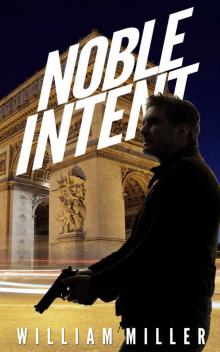 Noble Intent
Noble Intent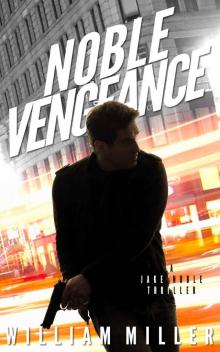 Noble Vengeance
Noble Vengeance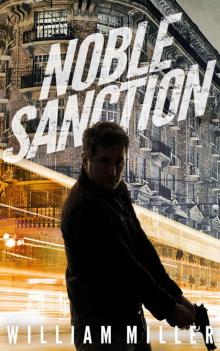 Noble Sanction
Noble Sanction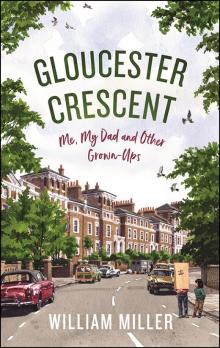 Gloucester Crescent
Gloucester Crescent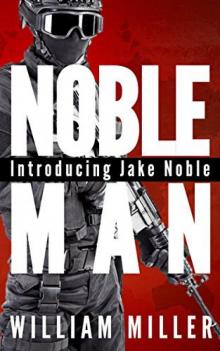 Noble Man
Noble Man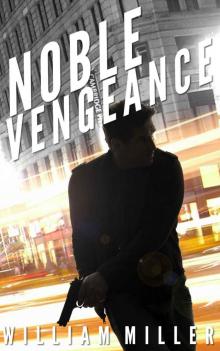 Noble Vengeance (Jake Noble Series Book 2)
Noble Vengeance (Jake Noble Series Book 2)